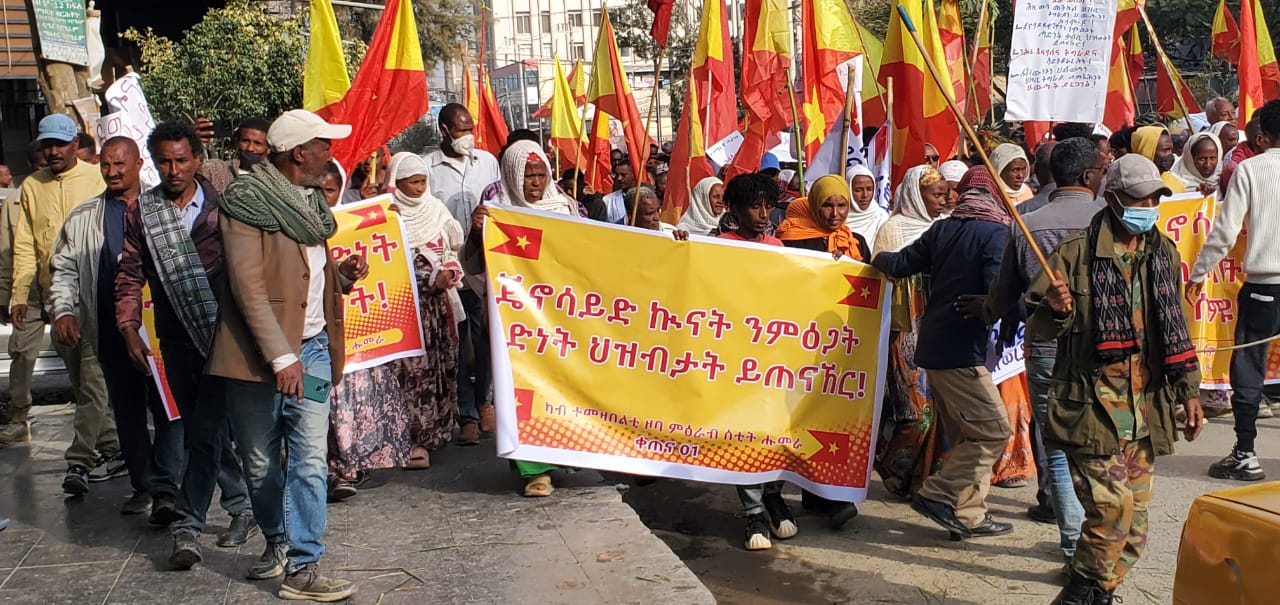By Dr. YONAS WORKINEH
In recent years, Addis Ababa has showcased remarkable development, highlighted by modern museums, parks, and ambitious infrastructure projects, including the ongoing corridor initiatives.
While these developments enhance the city’s landscape, they come at a significant human cost.
The Ethiopian government’s approach to urbanization raises critical questions about its prioritization of projects over the pressing issues faced by its citizens, particularly regarding the treatment of displaced individuals.
The ongoing displacement crisis in historical neighborhoods like Piassa, the implications of the government’s policies, and the broader socio-economic challenges affecting the population can’t be ignored.
Development versus Displacement
Urban Transformation and Its Consequences
Over the past six years, Addis Ababa has embarked on an ambitious urban agenda that aims to modernize its infrastructure and elevate its status as a continental capital.
However, this rapid urbanization has resulted in the demolition of numerous homes, especially in neighborhoods with rich historical significance, such as Piassa.
Established over a century ago, Piassa is not only a cultural landmark but also a vibrant community where many families have lived for generations.
In an alarming trend, thousands of households have been displaced with minimal notice, sometimes as little as five days.
This has resulted in chaos and trauma for many families, who suddenly find themselves homeless and without resources.
The government’s rationale for these demolitions—often framed as necessary for development—fails to address the human impact of such actions.
The Suffering of Displaced Residents
The psychological and emotional ramifications of forced displacement are profound.
Many residents, who have lived in their homes for three to four generations, face not only the loss of their property but also the disintegration of their community ties.
Reports of suicides, heart attacks, and strokes among the displaced illustrate the severe toll this crisis has taken on individuals’ mental health.
The urgency imposed by the government, under the guise of “corridor development,” neglects the personal stories and struggles of those affected.
Governmental Prioritization: A Controversial Approach
Disregard for Socioeconomic Issues
Despite the evident suffering among the populace, the Ethiopian government appears to prioritize Urban beautification over addressing pressing societal issues.
The nation grapples with high inflation, food insecurity, and a foreign currency deficit that severely impacts everyday life.
However, government officials often deny the existence of these challenges, opting instead to focus on urban beautification projects.
This prioritization raises concerns about the effectiveness of governance and the responsiveness of the state to its citizens’ needs.
The demolition of homes in Addis Ababa has sparked accusations of politically motivated actions.
Ethiopian opposition parties, including the AEUP, EPRP, Amhara Ghion Movement, and Enat Party, have jointly criticized the government’s approach as reflective of gentrification driven by ethnic ideologies.
The targeting of specific neighborhoods, often populated by marginalized groups, has raised alarms about ethnic discrimination and social injustice.
The situation escalated when prominent Ethiopian playwright Azeb Worku publicly condemned the government’s actions on her official Facebook page.
On September 14, she expressed her outrage highlighting the inhumane treatment of displaced residents who were given an unreasonably short notice to vacate.
Her plea for a more humane approach was met with harsh repression; she was detained at local police station for her criticisms, highlighting a disturbing trend where dissent is increasingly stifled.
Such actions reveal an intolerance for opposition and a troubling erosion of freedom of speech in Ethiopia.
A Call for Compassionate Governance
The Need for Prioritization of Human Rights
Good governance must prioritize the rights and well-being of the people, particularly those facing hardship.
The ongoing displacement crisis in Addis Ababa underscores a failure to engage with residents and address their concerns.
There is an urgent need for a more compassionate and respectful approach to urban development—one that acknowledges the historical significance of neighborhoods and the rights of individuals.
Recommendations for Improvement
The government should implement policies mandating a minimum notice period for relocations, allowing affected families adequate time to prepare and seek alternative.
Establish inclusive forums for dialogue where residents can voice their concerns and participate in decision-making processes.
Review current urban policies to ensure they balance modernization with the preservation of historical neighborhoods and respect for residents’ rights.
This may involve revisiting zoning laws and development plans to minimize displacement.
Transparency and Accountability
The government should ensure that its decision-making processes are transparent and accountable, particularly regarding urban projects that significantly impact communities.
This could involve public consultations and independent assessments of proposed developments.
Conclusion
The situation in Addis Ababa highlights the critical need for a governmental approach that prioritizes the welfare of its citizens over ambitious urban projects.
The displacement of thousands of families without consideration for their well-being not only disrupts lives but also erodes trust in the government.
Moving forward, a shift toward compassionate governance—one that emphasizes human dignity, community engagement, and responsible urban planning—is essential for fostering a truly developed and inclusive city.
By addressing these pressing issues with urgency and empathy, the Ethiopian government can pave the way for a more equitable future for all its citizens.


